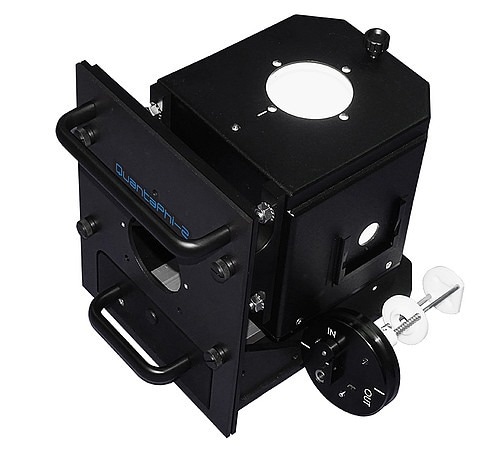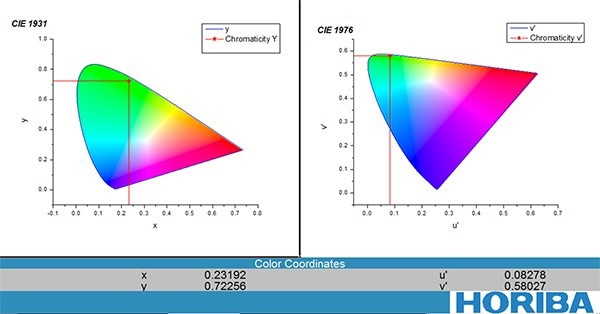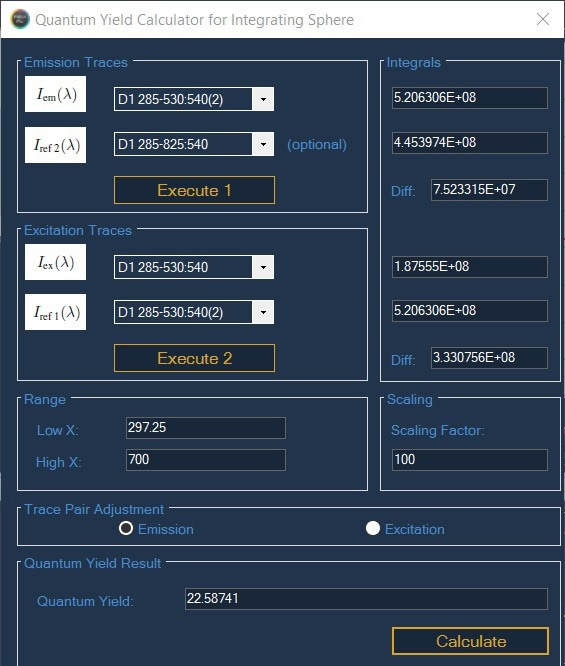Horiba Scientific’s QuantaPhi-2 consists of a large, 121 mm internal diameter Spectralon® integrating sphere exhibiting outstanding reflectivity ranging from 250 to 2500 nm. This is an internal slide-in, tray-mounted integrating sphere with two excitations and two emission ports.
Every port consists of a Spectralon plug with sphere-matching curvature for when openings are not in use. The QuantaPhi-2 features a special bottom-loading sample tray available for powders or solids, guaranteeing that any sample spills are restricted to the small and replaceable Spectralon cup.
The sample cup measures a diameter of 1 cm and a depth of 3 mm, with a quartz coverslip for powder containment. This bottom-loading tray could help save an enormous amount of time and money, as preventing sphere contamination is considered the number one priority while an integrating sphere has been utilized.
The QuantaPhi-2 consists of a center-mounted 10 mm cuvette sample holder for PLQY studies of samples in solution.
Upconversion PLQY and laser-excited PLQY
This PLQY sample tray accessory enables direct mounting of DPSS lasers on the front of the sample tray for upconversion PLQY or laser-excited PLQY. Users can contact HORIBA for a range of available DPSS lasers.

Image Credit: Horiba Scientific
Features
Direct quantum yield measurements of unknown luminescent samples
Quantum yield is considered to be one of the most significant parameters that help in the characterization of the photoluminescence of materials. For a wide range of applications, photoluminescence quantum yield (PLQY) measurements are vital. The applications include photovoltaics, new material development, and also the development of new fluorescence probes.
HORIBA has thousands of PLQY citations worldwide and has long been known for its excellent quality of PLQY performance for the most challenging applications.
The QuantaPhi-2 is a new internal photoluminescence quantum yield (PLQY) and CIE measurement accessory available for compatible HORIBA fluorescence spectrometers. Listed below are the ones that the compatible HORIBA fluorescence systems have included:
- Fluorolog-QM modular research spectrofluorometer
- FluoroMax Plus bench top research spectrofluorometer
- Nanolog modular research spectrofluorometer
This sample tray accessory consists of an all-reflective sphere into which a sample has been positioned. The sample’s measurement, and of a non-fluorescent blank, enables the direct measurement of the quantum yield of a solid, solution sample, or powder.
The QuantaPhi-2 has been integrated with the greatest sensitivity and flexible spectrofluorometers, and their user-friendly, steadfast QY and colorimetry software offers an accessible, high-quality, and complete PLQY solution.
The molecule’s quantum yield or material has been specified as the number of photons emitted as a fraction of the number of photons that have been absorbed. This characteristic property of a fluorescent molecule, or a fluorophore, is highly significant for comprehending molecular behavior and optimization for several primary materials.
Materials and Applications for Which PLQY Are Important Parameters
- Photovoltaics (PV) and solar cells
- Novel nanomaterials
- Quantum dots
- Paints, coatings,
- Rare earth materials
- Nanoparticles
- New fluorescent probes
- Biomarkers and biosensors
- Graphene or single-walled carbon nanotubes
- Cured/doped polymers, gels, and hydrogels
- Thin films and coatings
- Light-emitting devices available
- Lighting and display materials (OLED, LED, and phosphors)
Characterize light-emitting devices
Electroluminescent quantum yield (ELQY) measurements of light-emitting devices, such as OLEDs, LEDs, and other luminescent sources, are completely accommodated by the QuantaPhi-2.
A steadfast wiring port has aided the devices’ electrical connections in the bottom loading drawer. This enables a customer to feed wires to their custom-modified sample cup holder. Below are the CIE values and total luminous intensity plots of a simple LED quantified using the QuantaPhi-2.

HORIBA FluorEssence software interface for the Fluoromax and Nanolog spectrofluorometers. Image Credit: Horiba Scientific
Software that makes PLQY simple and accurate
The QuantaPhi-2 integrating sphere accessory is compatible with several HORIBA fluorescence spectrometers. All of these systems consist of a PLQY App, which streamlines the process of obtaining a precise QY value for an unidentified sample.

FelixFL software on the Fluorolog-QM modular research spectrofluorometer incorporates a quantum yield calculator which, when coupled with an integrating sphere, allows you to calculate the quantum yield with ease. Image Credit: Horiba Scientific
Specifications
QuantaPhi-2 Hardware Specifications
Source: Horiba Scientific
| . |
. |
| Sphere material |
*Spectralon® |
| Reflective wavelength range |
> 95%, 250 to 2,500 nm |
| Sphere inner diameter |
121 mm |
| Port fraction (liquid mode) |
1.043%
|
| Port fraction (solid mode) |
2.103%
|
| Powder sample cup |
13 mm diameter x 3 mm depth with 15 mm quartz coverslip |
| Liquid sample holder |
1 cm path quartz cuvettes (2 to 4 mL) |
| Gas purge connectors |
1/4" ID tubing |
| PLQY sample tray size |
152 x 183 x 190 mm (W x D x H) |
| PLQY sample tray weight |
4.7 kg |
QuantaPhi-2 Performance Specifications
Source: Horiba Scientific
| . |
. |
| PLQY accuracy (Quinine Sulfate, Accepted value QY = 55 ± 10%) |
55.1 ± 0.8 |
| PLQY accuracy (Rhodamine, Accepted value QY = 93 ± 10%) |
93.2 ± 0.5 |
| Precision, Relative Standard Deviation (RSD) |
2% |
| PLQY wavelength range with Fluorolog-QM |
250 to 2,200 nm (detector dependent) |
| PLQY wavelength range with FluoroMax Plus |
250 to 1900 nm (detector dependent) |
| PLQY wavelength range with Nanolog |
250 to 2,200 nm (detector dependent) |
*Spectralon is a registered trademark of Labsphere, Inc.